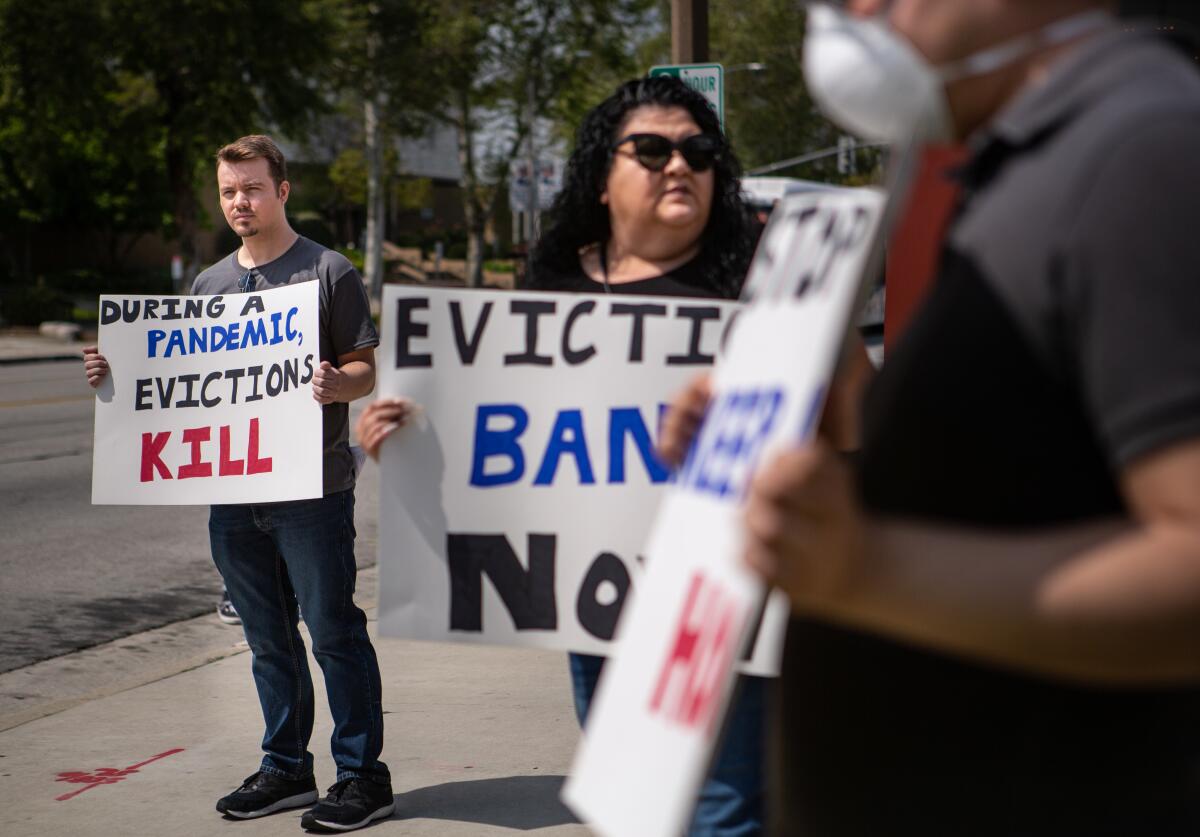No deal yet in Sacramento to help struggling California renters

- Share via
SACRAMENTO — With less than two weeks before a statewide moratorium on renter evictions expires, California lawmakers on Thursday declined to back a plan that would have provided tax credits for landlords while sending a separate proposal that would protect tenants back for additional negotiations with Gov. Gavin Newsom.
Three other bills dealing with affordable housing and homelessness were also sidelined for the year as the Senate and Assembly appropriations committees rushed to meet an end-of-the-month deadline for acting.
Join us Wednesday for a live video event with L.A. Times reporters Liam Dillon and Andrew Khouri, along with columnist Erika Smith. They’ll answer your questions about covering evictions.
“These are trying times, obviously,” said Assemblywoman Lorena Gonzalez (D-San Diego), chairwoman of the Assembly Appropriations Committee, as she looked out over a mostly empty chamber where members of the panel sat wearing face masks and spaced apart to avoid the spread of the coronavirus.
The panel sidelined a measure by state Sen. Anna Caballero (D-Salinas) that would have created a process for preventing evictions for three years as long as a landlord and tenant reach an agreement on forgiving rent in exchange for the landlord receiving a tax credit.
The proposal was part of a sweeping economic recovery effort crafted by Senate Democratic leaders in May that has been stymied in partby a legislative calendar that was shortened due to public health concerns over lawmakers convening in Sacramento.
Before the bill was shelved, Caballero signaled that she was working with other legislators and Newsom on finding a way to protect landlords and tenants.
Senators moved forward a bill by Assemblyman David Chiu (D-San Francisco) that would prevent evictions for up to a year. The measure, AB 1436, would block evictions of renters who missed payments during the COVID-19 “emergency period,” which would end 90 days after the state of emergency order is lifted or April 1, 2021, whichever occurs first.
Landlords would also be allowed mortgage forbearance under the legislation.
“California is facing a tsunami of evictions and foreclosures if we do not act,” Chiu said Thursday. “This bill is a balanced approach to ensure we avoid mass displacement and increased homelessness during the pandemic.”
He cited a U.S. Census Bureau survey from last month that showed 4.3 million renters in California reported “little to no confidence” in their ability to pay rent in August.
The measure is opposed by groups including the California Chamber of Commerce and the California Apartment Assn., which represents 50,000 owners and managers.
Debra Carlton, an executive vice president of the association, said the delay in rents until 2021 will be a burden for senior landlords who depend on rentals for income and owners who need the revenue to pay mortgages and repairs.
“These owners will lose their rental units, and tenants will eventually lose their homes,” Carlton told lawmakers during a hearing earlier this week.
The Senate Appropriations Committee initially voted to send the bill to the full Senate, but after the Assembly panel shelved Caballero’s legislation, the Chiu proposal was redirected to the Senate Rules Committee for additional discussion.
“Negotiations on this issue are ongoing,” Chiu said. “It’s common for big bills like this to be held in the Rules Committee until there is a resolution on the issue.”
Jesse Melgar, the governor’s press secretary, said Newsom’s office is working with legislators toward a resolution.
“The governor is committed to partnering with the Legislature on a solution to the eviction crisis before the session ends, and work is well underway with legislative leaders and stakeholders,” Melgar said.
The clock is ticking on negotiations after the state Judicial Council last week extended its moratorium on courts processing evictions until Sept. 1.
Meanwhile, Assembly members also shelved a measure on Thursday that sought to increase the construction of affordable housing by giving cities the power to increase housing density by rezoning properties in areas near transit and jobs.
The measure was touted by its author, state Sen. Scott Wiener (D-San Francisco) as a “light touch” approach to addressing the lack of affordable housing after a more ambitious bill to force cities to increase housing density failed in the Legislature in January.
This year’s bill would have allowed cities to zone any parcel for up to 10 units of housing if it is located in a transit or jobs-rich area, or an urban infill site, even if there are restrictions — including those approved by voters — preventing such density.
“I’m disappointed that SB 902 won’t be advancing,” Wiener said in a statement. “It would have provided cities with a powerful tool to zone for new housing. Quite a few housing bills have died this year in both houses, but we need to get right back up and keep fighting next year for forward-looking housing legislation.”
He noted that seven other housing bills have made it to the Assembly floor, “so we have an opportunity to make significant positive change over the next week and a half.”
The failed predecessor bill, Senate Bill 50, was recently attacked in an op-ed by President Trump and Housing Secretary Ben Carson in the Wall Street Journal that called the proposal “a relentless push for more high-density housing in single-family residential neighborhoods” and said it has become “the mainstream goal of the left.”
Wiener called it “a racist op-ed that attacks me for fighting to legalize affordable housing in neighborhoods zoned to only allow single-family housing. This is an ugly and desperate attempt to appeal to white suburbanites.”
On Thursday, lawmakers also sidelined two bills by Chiu aimed at addressing homelessness. Assembly Bill 3269 would have created a new position of Housing and Homelessness Inspector General and required the state to conduct a study on the needs of homeless people and gaps in services.
The measure would have also required cities and counties to develop actionable plans to address homelessness.
The other bill that was held, Assembly Bill 3040, would have given local governments additional credit toward meeting mandated housing goals if they identify sites that contain a single family home but are allowed up to four units.
“I am disappointed that these substantive, consensus measures will not move forward this year,” Chiu said. “We cannot let up on our efforts to address the housing and homelessness crises amidst this pandemic.”
The failure of many housing bills to gain traction with lawmakers was criticized Thursday by Brian Hanlon, co-founder and CEO of the housing advocacy group California YIMBY.
“With its refusal to pass a housing production package that addresses the depths of the housing shortage, the California Legislature has once again failed the people of California,” Hanlon said.
More to Read
Sign up for Essential California
The most important California stories and recommendations in your inbox every morning.
You may occasionally receive promotional content from the Los Angeles Times.















